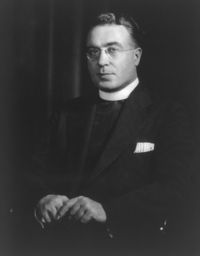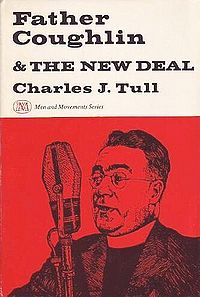Charles Coughlin
 From Conservapedia
From Conservapedia | Charles E. Coughlin | |||
|---|---|---|---|
| |||
| Born | October 25, 1891 Hamilton, Ontario, Canada | ||
| Died | October 27, 1979 Bloomfield Hills, Michigan | ||
| Religion | Catholic | ||
Charles Edward Coughlin (October 25, 1891 - October 27, 1979), often called Father Coughlin or the 'Radio Priest', was a Roman Catholic priest with a very wide following for his political broadcasts in the United States in the 1930s. He became the spokesman for the Catholic Irish and for all poor Americans. He began as a liberal who supported the New Deal and denounced bankers, but broke with President Franklin D. Roosevelt around 1934 because he felt Roosevelt was controlled by Jewish bankers. He was silenced by the Catholic Church in 1942 and retired from politics.
Contents
Career[edit]
Coughlin, a Canadian by birth, graduated from college in Canada in 1911. He joined the Congregation of St. Basil and was ordained to the priesthood in 1916. He was assigned to teach at Assumption College in Ontario and on weekends assisted at parishes in nearby Michigan. In 1923 he was incardinated into the Diocese of Detroit, where Bishop Michael J. Gallagher, his close friend and defender, asked him to build a new parish in suburban Royal Oak, and name it in honor of the newly canonized St. Therese of Lisieux, affectionately known as "the Little Flower." In an effort to raise funds for this endeavor he negotiated his first radio broadcast which aired on WJR in Detroit on October 17, 1926. Coughlin's program began as a series of sermons. After the Wall Street crash of 1929, he spoke to the frustrations of the people, attacking Communism and addressing monetary issues. By 1930, a major radio network, the Columbia Broadcasting System picked up his program nationally; he reached millions of listeners on his "The Golden Hour of the Little Flower."
New Dealer[edit]
In the early 1930s he enthusiastically endorsed President Roosevelt and the New Deal, coining the slogan "Roosevelt or Ruin!" The tenor of his talks changed to attacks on Wall Street, international finance, and the New Deal itself. As Coughlin was attracting audiences in the tens of millions, Roosevelt sent Irish Catholic intermediaries including Joseph P. Kennedy, Sr. to try and quieten the priest, to no avail.
Presidential Politics[edit]
n 1934 the priest founded the National Union for Social Justice, and in 1936 established the weekly newspaper Social Justice. That same year he joined with the Protestant evangelist and anti-Semite Gerald L. K. Smith and with Dr. Francis Townsend of California to found the anti-Roosevelt Union Party. They created a left-wing alternative to the New Deal's stalled progress, the Union Party. It made old-age pensions a central issue and offered Populist North Dakota Congressman William Lemke as a presidential candidate in 1936. Union Party supporters were not economically marginal proletarians or political radicals, but mostly blue collar working men and women who faced financial disaster due to the depression and sought future security.[1] The radical economic programs of Townsend and Coughlin gained mainstream appeal at the height of the depression. Coughlin's aggressive rhetoric escalated; he ripped off his Roman collar and called the President "Franklin Double-Crossing Roosevelt" and a liar and a betrayer. Catholics and non-Catholics alike were disturbed; the Vatican cautioned Bishop Gallagher, but the bishop was supportive of Coughlin until he died in 1937.Lemke won 2% of the vote and the party disappeared.
Anti-Semitism[edit]
From 1936 Coughlin began to express admiration for Hitler and Mussolini; by 1938 he was attacking American Jews; Social Justice published extracts from a forgery called The Protocols of the Elders of Zion. He endorsed the "Christian Front", an anti-Semitic organization suppressed by the FBI in 1940; it was responsible for physical attacks on Jewish families on the east coast.[2] In 1938, following Kristellnacht in Nazi Germany, he blamed the Jewish victims for the assaults they had suffered.
Suppressed[edit]
By the late thirties, pressure was growing from both inside and outside the Church to stop Coughlin's broadcasts. Several major networks refused to carry his talks, or insisted on prior approval of his scripts; but he only ceased broadcasting upon receipt of a direct order from the Bishop of Detroit in 1942. He remained a parish priest but stayed totally out of the limelight.
Further reading[edit]
- Brinkley, Alan. Voices of Protest: Huey Long, Father Coughlin, & the Great Depression (1983) excerpt and text search
- Pietrusza, David. Roosevelt Sweeps Nation: FDR’s 1936 Landslide and the Triumph of the Liberal Ideal (2022)
- Tull, C. J. Father Coughlin and the New Deal(1965)
- Warren, Donald. Radio Priest: Charles Coughlin, The Father of Hate Radio (1996).
See also[edit]
References[edit]
- ↑ Matthew Bowman, "'It Is Time We Do Something Radical': the Union Party in Utah," Utah Historical Quarterly 2004 72(3): 253-270
- ↑ Stephen H. Norwood, "Marauding Youth and the Christian Front: Antisemitic Violence in Boston and New York During World War II," American Jewish History 2003 91(2): 233-267
External links[edit]
Categories: [New Deal] [Irish-Americans] [Religion and Politics] [Anti-Semitism]
↧ Download as ZWI file | Last modified: 02/27/2023 03:51:06 | 5 views
☰ Source: https://www.conservapedia.com/Charles_Coughlin | License: CC BY-SA 3.0
 ZWI signed:
ZWI signed:

 KSF
KSF